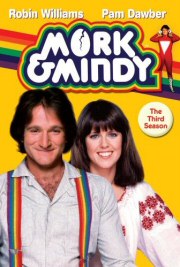 With the temperature dropping, it's time to find someone to keep you warm. Find your hookups with our online dating guide!
With the temperature dropping, it's time to find someone to keep you warm. Find your hookups with our online dating guide!
The Third Season
- Comedy
- 1980
- Buy the DVD
Reviewed by Will Harris
()
ork and Mindy” will always be remembered for how it took a relative unknown named Robin Williams and turned him into a superstar. But deeper examination of the series reveals that the producers never really got a handle on how to make the show on any level beyond the recurring stage direction, “Robin ad-libs for twenty-three and a half minutes.” Granted, the premise lent itself to Williams’ off-the-cuff actions, reactions and one-liners – an alien comes to Earth, lives in the attic of a young woman’s apartment, and tries to unravel the mysteries of humanity – but the problem was in the producers’ inability to let well enough alone.
Season One gave Mork (Williams) a perfect group of characters to play off: Mindy (Pam Dawber); her father, Fred (Conrad Janis); her grandmother, Cora (Elizabeth Kerr); and a streetwise punk named Eugene (Jeffrey Jacquet). Unfortunately, the network wanted a younger demographic, so Season Two began by bidding adieu to Mindy’s father and grandmother, and introducing her friends Remo (Jay Thomas) and Jean (Gina Hecht), who owned a deli. Also brought into the mix was Mindy’s cousin, Nelson Flavor (Jim Staahl), who was on a quest to win his way into political office. To throw a familiar face into the mix, Tom Poston came aboard as Mork and Mindy’s landlord, Mr. Bickley. The plan resulted in the show doing a ratings nosedive, so you’d figure that Season Three would find the producers getting rid of the chaff, right?
Yeah, not so much.
Okay, yes, they wised up and brought back Fred, and Cora managed to sneak onto the show for a guest spot. But not only did they keep all of the other extraneous characters in the regular cast, they even added a new one: Glenda Faye Comstock, a hot and sexy young widow who preferred tight and confining clothing in order to prominently display her bosom. Furthermore, they gave Mork a job at a daycare center, which gave him the opportunity to interact with kids on a regular basis (one of whom was a young Corey Feldman). They made more of Mindy’s job at the TV station by introducing her boss, Miles Sternhagen, whose six-martini lunches were only funny because the character was played by Foster Brooks, who did the best drunk act in the business. Fred’s new wife, Cathy (Shelley Fabares), popped up a few times as well, as did guest stars like Ross Martin (“The Wild Wild West”), Lyle Waggoner (“Wonder Woman”) and Elinor Donahue (“Father Knows Best”). Clearly, the producers knew they had one of the best ad-libbers in comedy as the star of their show; as such, it seems almost perverse that they would have continued to surround him with more and more characters to take the spotlight away from him.
Another problem with the show was its tendency to want to be more dramatic than it had any right to be. Anyone who can keep from laughing during the scene in the season premiere where “The Way We Were” is played over Mindy reminiscing about her favorite moments with Mork from previous episodes deserves some sort of medal. And, yet, once in awhile, they succeeded. Surprisingly, the year’s most poignant episode is not the season finale, when Mindy reveals her love for Mork, but “Mork Meets Robin Williams,” when Mindy is tasked by the TV station to score an interview with the famous comedian who, coincidentally enough, looks just like Mork. Admittedly, there are two really big problems with the premise:
- Mork resembles Robin Williams so closely that he’s mobbed by Williams’ fans wherever he goes in Boulder, yet prior to this, no one -- not even Mindy -- has ever noticed the similarity between the two of them.
- It is impossible to watch the episode without eventually finding yourself thinking way too hard about the scenario (“Okay, wait a second: Mork is meeting Robin Williams, who stars in a TV show called ‘Mork and Mindy,’ except that he apparently doesn’t, because if he did, then everyone would already know that Mork was an alien. So, what, is this a parallel universe or something, then?”)
When Williams finally turns up to play himself, the episode turns into a treatise on the price of fame. In his report to Orson at the conclusion of the half-hour, Mork speaks about celebrities can’t always handle all of the strings that come attached to their success, specifically the inability to maintain any semblance of privacy, closing by citing examples of those who were victims of their own fame, including Elvis Presley, Marilyn Monroe, Janis Joplin, Jimi Hendrix, Lenny Bruce and Freddie Prinze. When Mork gets to the last name on the list, however, you realize what event had inspired the episode in the first place: the murder of John Lennon, which had occurred only two months prior to its airing.
Whoops. Sorry to bring down the review.
“Mork and Mindy: The Third Season” still has its fair share of laughs, of course. Williams still gets plenty of opportunities to go nuts, and Poston’s dry delivery makes everything he says sound funny, but the idea of teaming Williams with guest-star Jonathan Winters in “Mork and the Family Reunion” proved so successful that it resulted in Winters being added to the cast the following year. Ultimately, though, you can’t help but be aware that if it wasn’t for Williams, there probably never would’ve been a third season of “Mork and Mindy,” let alone a fourth.
Special Features: Curse you, Paramount! Why must you continue to release these sitcom sets with absolutely no special features whatsoever?
You can follow us on Twitter and Facebook for content updates. Also, sign up for our email list for weekly updates and check us out on Google+ as well.











